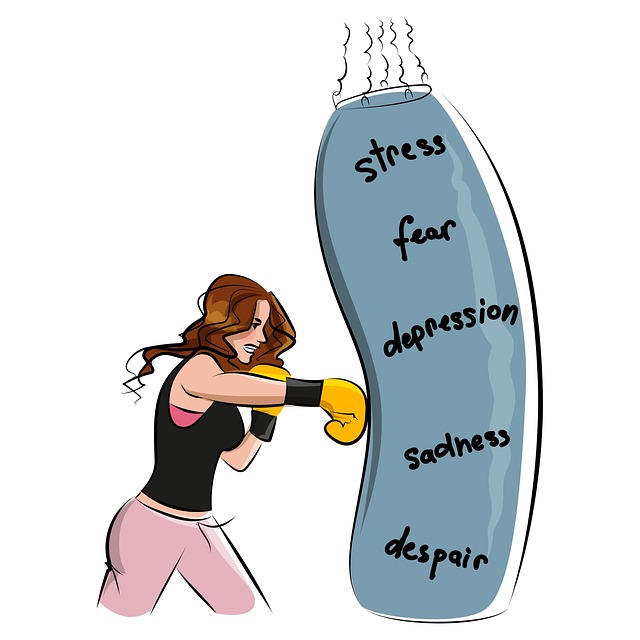Depression severely affects sexual health, causing what's known as Superior Sexual Dysfunction (SSD). This stems from both physical and emotional factors, impacting libido, arousal, and intercourse. Addressing depression through self-awareness exercises like meditation and journaling is crucial for enhancing sexual well-being. Overlooking sexual health in depression prevention strategies is common but harmful; effective therapy approaches, mental wellness journaling, exercise, mindfulness, and specialized sex therapy can improve self-awareness, emotional regulation, partner communication, and intimacy, ultimately supporting mental wellness. A holistic, long-term approach focusing on lifestyle changes, support systems, and community advocacy for mental health policies can prevent depression and promote overall well-being, including sexual health.
Depression prevention strategies are essential for maintaining overall well-being, including sexual health. This article explores three key areas: understanding depression and its impact on sexual health, effective therapy approaches for superior sexual dysfunction, and lifestyle changes and support systems for long-term prevention. By integrating evidence-based practices, individuals can enhance their mental and physical well-being, fostering a healthier, more fulfilling life. Discover practical steps to combat depression and improve your sexual quality of life.
- Understanding Depression and Its Impact on Sexual Health
- Effective Therapy Approaches for Superior Sexual Dysfunction
- Lifestyle Changes and Support Systems for Long-Term Prevention
Understanding Depression and Its Impact on Sexual Health

Depression significantly impacts various aspects of an individual’s life, including their sexual health. It can lead to a decline in libido, difficulties achieving or maintaining arousal, and pain during intercourse, collectively known as superior sexual dysfunction therapy challenges. This is not merely a physical symptom but also stems from the emotional and mental state associated with depression, where individuals may feel disinterested in intimate activities or experience negative thoughts about their bodies and relationships.
Addressing depression is crucial for enhancing sexual well-being. Self-awareness exercises, such as meditation and journaling, can help individuals recognize triggers and develop coping strategies to manage symptoms effectively. Mental illness stigma reduction efforts and public awareness campaigns development play a significant role in encouraging affected persons to seek support without fear of judgment, thereby fostering open conversations about the intersection of depression and sexual health.
Effective Therapy Approaches for Superior Sexual Dysfunction

Depression prevention strategies often overlook an aspect of mental health that significantly impacts overall well-being: sexual health. Effective therapy approaches for Superior Sexual Dysfunction (SSD) are crucial in addressing this often-taboo subject. Mental wellness journaling and exercise guidance can be powerful tools to help individuals explore and express their feelings, improving self-awareness and emotional regulation.
Stress reduction methods, essential for burnout prevention strategies, particularly in healthcare providers, can also alleviate symptoms of SSD. By incorporating techniques such as mindfulness meditation, cognitive behavioral therapy (CBT), or even specialized sex therapy, individuals can enhance communication with partners, improve intimacy, and ultimately, support their mental wellness.
Lifestyle Changes and Support Systems for Long-Term Prevention

Depression prevention isn’t just about immediate interventions; it’s a long-term commitment to mental wellness. Lifestyle changes play a pivotal role in sustaining positive mental health. Regular exercise, for instance, boosts mood by increasing brain chemicals that affect how we feel and think. A balanced diet also fuels your body and brain optimally, impacting mental clarity and emotional resilience. Adequate sleep is another cornerstone; it allows the brain to rest, recover, and consolidate memories.
Support systems are equally vital. Building and nurturing relationships offers a sense of belonging and purpose. Engaging in therapy, whether individually or through Superior Sexual Dysfunction Therapy, can help individuals process and manage difficult emotions effectively. Journaling and self-awareness exercises further empower individuals to track their moods, identify triggers, and develop coping mechanisms tailored to their unique needs. Strengthening these aspects of mental health—through lifestyle adjustments, therapy, and supportive networks—can significantly contribute to long-term depression prevention and overall well-being. Mental Health Policy Analysis and Advocacy also play a crucial role in creating communities that prioritize and support mental wellness.
Depression prevention is a multifaceted approach, with understanding and addressing sexual health being crucial. By combining effective therapy approaches like Superior Sexual Dysfunction Therapy with positive lifestyle changes and robust support systems, individuals can effectively manage depression and promote long-term well-being. Remember that seeking help is a sign of strength, and with the right strategies, recovery and fulfillment are achievable.














